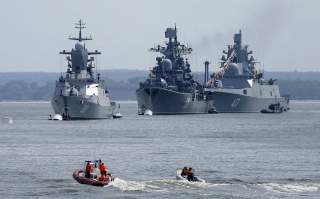The Black Sea: How Russia Is Looking to Cause Chaos for NATO
Russia will assert itself with vigor in the Black Sea region, taking every chance to embarrass and discredit Western inroads and offering physical challenges to Western forces operating there.
All three of these types have been active with their Kalibr missiles in the Caspian and Eastern Mediterranean seas during the Syrian crisis. The fact that these ships have a modest range is not considered limiting since, as discussed earlier, most of Russia’s core interests lie within the former Soviet space (security belt strategy). This is also convenient in other ways, inferring that Moscow, despite its posturing, may actually see that there is no real need to build a costly new “blue water” capability—something that it couldn’t afford and that the Russian shipyards would be incapable of producing in any case.
However, and returning to the nexus, it is not just about geopolitics either. The Black Sea is destined to play a crucial part in Russia’ economic plans too. It represents an important transit corridor for goods and energy into Europe, which forms an important pillar in Russia’s economic growth plans. The Novorossiysk fuel oil terminal (with its annual capacity of five million tons) and the container port are crucial enablers here, having attracted considerable investment in recent years. Moreover, control over regional ports like these and the sea lanes that supply them would give Russia the power to choke trade and energy routes into Europe should it so desire. This disruption could also include energy supplies received via pipeline from the Caspian Basin to Europe. For example the “Turkish Stream” natural gas pipeline which when complete, will supply Turkey and Southern Europe with natural gas clear of Ukrainian territory (two pipelines, each with an annual capacity in excess of fifteen billion cubic meters), would be an easy target. Threats like these could weaken prospects for future energy deliveries from states like Azerbaijan and Turkmenistan, thereby forcing them into more dependent relationships with Moscow. More importantly perhaps, they could undermine the European Union’s efforts to seek energy diversity from outside Russia’s orbit.
From a broader perspective too, Russia’s economic future continues to depend on a bullish oil market, thus Moscow’s military presence in the Eastern Mediterranean and Middle East allows it to combine geopolitical advantages with economic ones. It is no coincidence, for example, that recent increases in crude prices, brought about by the growing tensions in Syria, have also resulted in increased oil revenues for Russian companies. In brief, therefore, we can expect Russia to assert itself with vigor in the Black Sea region, taking every chance to embarrass and discredit Western inroads and offering physical challenges to Western forces operating there. Russia will attempt to retain a comparative advantage by improving the quality of its small missile ships and by exploiting the terms of the Montreux Convention whenever possible.
Angus Ross is a professor of joint military operations at the Naval War College and something of an amateur historian, while Andrew Savchenko writes on political risk in the post–Soviet space and teaches Economy and Society at RISD. The views expressed here are theirs alone.
Image: Reuters

